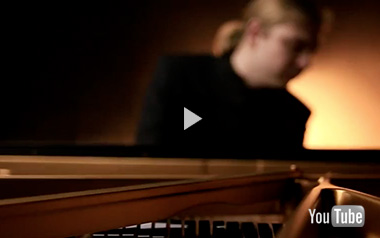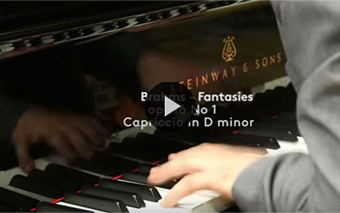Next Concerts
Jul 30, 2024
Festival Pablo Casals de Prades
Aug 1, 2024
BBC Prom, Royal Philharmonic Orchestra with Vasily Pentrenko
London, United Kingdom
Ravel: Piano Concerto in G major
Venue: Royal Albert Hall
REVIEWS
Mar 24 2023
High Voltage with Altinoglu, Kozhukhin and the Frankfurt Radio Symphony Orchestra
“Ravel’s Concerto in G takes us to completely different worlds. From that suggestive, almost hypnotic evocation of Debussy, we move on to a piece full of vitality, smiles, light-heartedness and, as its author intended, fun. Exultant fun from beginning to end, with hardly any respite, barely in the second movement, which never ceases to smile charmingly, albeit in a calmer way. Music that fits like a glove to the vitalistic nerve of the French maestro, who put all the rhythmic voltage into a vibrant accompaniment for the Russian soloist Denis Kozhukhin, who in turn demonstrated his excellent level once again.
As has been appreciated on previous occasions, the Russian’s sound is beautiful and has sufficient presence, although it does not dazzle. He shades beautifully and handles the pedal with general restraint, only occasionally overstepping that balance. He translated the fast-paced score apolloniously and with impeccable momentum, with a good dose of panache and fantasy, very successful realisation of the music’s jazzy resonances, and enviable intensity, connecting very well with the baton in a reading in which the rhythmic energy shone through.”
Feb 28 2023
Denis Kozhukhin, a wellspring of emotions
“The Russian-born pianist Denis Kozhukhin responded with an extraordinary concert to the expectations created by his first visit to the Alicante Concert Society. Despite his youth, he showed signs of a musical maturity that places him at the top of the world’s pianists, with an exceptional brilliance in both technical and expressive aspects. The result was an exquisite performance from the first note to the last, with an emotional connection with the audience who enjoyed, fascinated, the concert.
He opened the concert with Schumann’s Kinderszenen (Children’s Scenes), Op. 15, a set of thirteen piano pieces inspired by the composer’s childhood memories. Almost twenty minutes of excellent music in which Kozhukhin knew how to transmit the emotional depth and sophistication that evokes the inner world of childhood, reverie, with a poetic interpretation of the highest level that did justice to the mastery of the composer’s musical writing. In his interpretation, he combined apparent simplicity with a wide range of rhythms and figures that conveyed a sense of vitality.
When he had already won over the concert-goers, he tackled with extreme subtlety and determination a Selection of Lyrical Pieces, one of the most transcendental works of the illustrious creator Edvard Grieg. The pianist, like a goldsmith, interpreted with precision the expressive craftsmanship that the composer offers in each tiny piece, many of them faithful to the melodies of traditional Norwegian and Danish dances. Kozhukhin played with fluidity and lyricism to deliver a sound that was clear and precise, as well as beautiful and delicate, contrasting with moments of intensity.
He ended the first part with Brahms’s beautiful and melancholy Three Intermezzi for piano, Op. 117. The artist put his virtuosity at the service of expressing the complex harmonies of the work, with moving lyricism and colour. His interpretation delved into the most melancholic and sensitive feelings, but he also knew how to transmit all the emotional intensity that the piece entailed.
After the interval he played the Sonata No. 21 in B flat major D960, one of Schubert’s masterpieces, full of melody and depth. Kozhukhin’s undeniable talent and mastery of technique masterfully drew the contrasts between moments of subtlety and elegance, and those full of energy and dynamism, until he dissipated the final tension with a decisive movement full of vivacity.
A prolonged ovation was rewarded by two colossal encores that thrilled the audience with their tenderness and emotion. The first was Tchaikovsky’s Album for Youth, no. 24 In the Church, and the second was Bach’s fantastic Siloti Prelude.”
Dec 29 2022
Nuno Coelho and Denis Kozhukhin with the Barenboim-Said Foundation Orchestra: The musical talent that never ceases
That dense sound of the inspired strings accompanied the exposition of the first theme of Rachmaninov’s concerto, in which Kozhukhin shone both technically (impeccable pulsation, even in the fastest passages of the Adagio sostenuto) and expressively, with intense phrasing in the extreme movements and articulated by a subtle rubato in the interlude while delicate according to the moment, in an outstanding performance. That he also knows how to use the keyboard as a means of communicating the most intimate sensations was evident in the very delicate way he phrased the propina (with an infinite number of dynamic gradations below the piano) “In the church”, the last of the pieces from Tchaikovsky’s Album of his youth.
Nov 19 2022
Denis Kozhukhin plays Grieg with the RSNO: if only all stand-ins were this good!
His playing was a focused wave of energy that shot a bolt of lightning through Grieg’s music.
Any time I’ve heard Kozhukhin before, it has been the dynamism and energy of his playing that impressed me most, so I was expecting a reading of the concerto that would shake the foundations and reinforce the piece’s muscularity. Not a bit of it! The keynote of Kozhukhin’s playing was its fluidity and lyricism, something apparent right from the opening tumble which sounded restrained and understated, leading into a first theme that was smooth and beguiling, not craggy or intimidating. In this he chimed perfectly with the orchestral sound coming from the Royal Scottish National Orchestra and conductor Jonathon Heyward, sound that was as beautiful as it was amenable, phrased as though to illuminate Grieg’s music delicately, never forcefully or garishly.
Muscular power did enter Kozhukhin’s playing, but not until the first movement’s cadenza, and even then it was slow in coming. Not until the big double octaves did it finally feel as though the lion’s cage had been unbolted, and this gave a foretaste of the thunderous power with which he would finish the finale, a movement that Heyward wound up tightly but then released in its gloriously expansive slower sections. In between these two outcrops came a slow movement blessed with rosy, soft-hued strings, a glowing solo horn and a blend with the piano that had been beautifully achieved. If only all late stand-ins were as successful!
Sep 30 2022
Denis Kozhukhin returned to the BBC Proms with the BBC Symphony & D. Stasevska
Denis Kozhukhin was the soloist for the Prom 8 at the Royal Albert Hall, performing Rachmaninov Piano Concerto No.2 with the BBC Symphony Orchestra under their principal guest conductor, Dalia Stasevska. The concert took place on July 20th, and the program also included works by Jóhann Jóhannsson, Hildur Guðnadóttir, and Tchaikovsky.
You can listen to the BBC Radio broadcast of the concert HERE
REVIEW by Seen and Heard International:
“As a performance, this Rachmaninov was a meeting of souls between Kozhukhin and Stasevska.”
“No doubting the fluency of Kozhukhin, nor the ideal pacing; the BBC Symphony Orchestra was on its best behavior, too, with a notably expressive first horn solo from Nicholas Korth in the first movement.”
“The finale was high-voltage, but not just super-virtuoso, but notable for the amount of detail (particularly woodwind) audible from the orchestra.”
“An encore, after the rapturous ovation accorded to Kozhukhin, was inevitable, and it could hardly have contrasted more (although still staying with Russia); the chorale-like ‘Mama’, No.4 from Tchaikovsky’s 1878 Children’s Album.”
“Then, as the final soft chord hung on the air, the Russian pianist Denis Kozhukhin launched into the familiar sequence of swelling chords that begins Rachmaninov’s 2nd Piano Concerto. This famous opening can sometimes be indulgently slow, but Kozhukhin remembered that it is only an introduction, not the main event, and brought us quickly to the main melody, while on the podium, Stasevska stood poised like a relay runner ready to take over. That combination of eager sensitivity and intelligence marked the whole performance, and it made the piece seem young and vital, rather than the sumptuous, over-upholstered star vehicle it can so easily become.”
“The pianist was Denis Kozhukhin, who did not take a heroic, look-at-me approach but played with humility and sensitivity. His restraint was compensated for by Dalia Stasevska, who was flamboyance itself, living every moment of the piece, as she did later with Tchaikovsky. The slow movement was pitched to perfection, bookended by Richard Hosford’s gorgeous clarinet solo and Kozhukhin’s magical placement of the final notes.”
May 10 2022
Killer concerto, life-affirming symphony: Kozhukhin, Saraste and the BBC SO
“Which is the most challenging of all piano concertos? Is it the one with the most notes, the fastest tempi, the most outrageous leaps for both hands or simply the longest in duration? Obvious candidates spring to mind, but irrespective of the criteria applied Prokofiev’s Piano Concerto no. 2 in G minor is surely a major contender.
Leaving aside the feats of prestidigitation from Denis Kozhukhin, accompanied here by the BBC Symphony Orchestra directed by Jukka-Pekka Saraste, I think it was the multitude of moods the soloist conjured up, more than the myriads of cascading notes, that was the standout factor in this performance. Kozhukhin began almost dreamily, tip-toeing from the shadows into early-morning shafts of sunlight radiated by the softly shimmering strings, with astonishing pre-echoes of what Ravel was later to do in his G major concerto.
Then, with one of those touches of legerdemain which Prokofiev in particular displays so frequently, we were into a sardonic march, elements of piquancy giving colour and edge to the textures. Although the orchestra as a unit scarcely detracts from the role of the soloist as a narrator – the composer marks these passages narrante – it is important that conductor and soloist maintain unanimity of purpose. Saraste and his players worked hand-in-glove with Kozhukhin throughout.
The first movement cadenza, which takes up all of four minutes, is like the opening Allegro of a grand piano sonata. It had all the ferocious energy which the colossalemarking suggests, but Kozhukhin also stressed the rhapsodic in his hushed control of the dynamics, like pure mountain water trickling over the scree. He resisted the temptation to take the Scherzo, a Vivace with a vengeance, if ever there was one, as fast as possible, maintaining instead rock-solid solidity in the succession of semi-quavers, the octave leaps cast off as dizzyingly as any high-wire act.
The third movement brought those moments of grotesque elegance, or elegant grotesquerie, which reminded me of Saint-Saëns’ Danse macabre. Here too the emotional colouring shifted almost imperceptibly, from dark and angry to cheery and remorseful, from the resentful to the resolute. In the Finale, where the composer’s marking is Allegro tempestoso, there was a quite eerie awareness of the tradition of full-blooded Russian romanticism from which Prokofiev had emerged, Rachmaninov and Scriabin shining through the textures, not least in the beautifully voiced half-tones. After all this enthralling pianism, it was an additional treat to hear the crystalline purity of Kozhukhin’s encore, Grieg’s To Spring.”
May 04 2022
A wonderfully dark, late romantic stream of sound flowed into the hall
“A wonderfully dark, late romantic stream of sound flowed into the hall. The soloist was a 35-year-old Russian Denis Kozhukhin. He began the concert with fatally loud bells, after which he began to strike deep, rising velvety chord movements over the passionate melody of the low strings.
Kozhukhin has warmth, splendor and power as well as poetry in his skillful grips. Kozhukhin, Rouvali, and the orchestra conjured a wide-wave wave motion for the concert, in the enchanting current of which tensions rose and fell, breathing wide.
Rachmaninov himself was very precise about how the vertices of the parts should be constructed. They must be stepped up in steps, weighing and measuring each tone and degree of power. When the climax is reached, the impression must be extremely natural. That’s exactly what happened in every part.
It made a great impression.”


